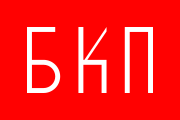
Back Балгарская камуністычная партыя Byelorussian Българска комунистическа партия Bulgarian Partit Comunista Búlgar Catalan Bulharská komunistická strana Czech Bulgarische Kommunistische Partei German Κομμουνιστικό Κόμμα Βουλγαρίας Greek Partido Comunista Búlgaro Spanish Bulgaaria Kommunistlik Partei Estonian Bulgarian kommunistinen puolue Finnish Parti communiste bulgare French
You can help expand this article with text translated from the corresponding article in Bulgarian. (January 2014) Click [show] for important translation instructions.
|
Bulgarian Communist Party Българска комунистическа партия | |
|---|---|
 | |
| Abbreviation | BKP/БКП |
| General Secretary | Dimitar Blagoev (first) Aleksandar Lilov (last) |
| Founded | 28 May 1919 |
| Dissolved | 3 April 1990 |
| Preceded by | BSDWP (NS) |
| Succeeded by | Bulgarian Socialist Party[1] |
| Headquarters | Party House, Largo, Sofia |
| Newspaper | Rabotnichesko Delo[2] |
| Youth wing | Dimitrov Communist Youth Union |
| Pioneer wing | Dimitrovist Pioneer Organization |
| Armed wing | Military Organisation of the BCP (1920–1925) Bulgarian People's Army (1944-1989) |
| Membership | 1,000,000 (1989 est.) |
| Ideology |
|
| Political position | Far-left |
| National affiliation | Fatherland Front (1942–1990) |
| European affiliation | Balkan Communist Federation (1921–1939) |
| International affiliation | |
| Colors | Red, Yellow, White |
| Anthem | The Internationale |
| Party flag | |
 | |
The Bulgarian Communist Party (Bulgarian: Българска комунистическа партия (БΚП), Romanised: Bŭlgarska komunisticheska partiya; BKP) was the founding and ruling party of the People's Republic of Bulgaria from 1946 until 1989, when the country ceased to be a socialist satellite state of the Soviet Union. The party had dominated the Fatherland Front, a coalition that took power in 1944, late in World War II, after it led a coup against Bulgaria's tsarist regime in conjunction with the Red Army's crossing the border. It controlled its armed forces, the Bulgarian People's Army.
The BCP was organized on the basis of democratic centralism, a principle introduced by the Russian Marxist scholar and leader Vladimir Lenin, which entails democratic and open discussion on policy on the condition of unity in upholding the agreed upon policies. The highest body of the BCP was the Party Congress, convened every fifth year. When the Party Congress was not in session, the Central Committee was the highest body, but since the body normally met only once a year, most duties and responsibilities were vested in the Politburo and its Standing Committee. The party's leader held the offices of General Secretary.
The BCP was committed to Marxism-Leninism, an ideology consisted of the writings of the German philosopher Karl Marx and of Lenin (from 1922 to 1955 as formulated by Soviet leader Joseph Stalin). In the 1960s, the BCP announced some economic reforms, which allowed the free sale of production that exceeded planned amounts. After Soviet Premier Mikhail Gorbachev took power in 1985, the BCP underwent political and economic liberalization, which promptly liquidated the party and dissolved the People's Republic of Bulgaria completely. After the end of the BCP, the party was renamed to the Bulgarian Socialist Party in 1990; though Bulgaria retained its socialist-era constitution until 1991 along with its Warsaw Pact membership until its dissolution that same year.
- ^ "Istoriya" История [History] (in Bulgarian). Bulgarian Socialist Party. Archived from the original on 29 March 2010. Retrieved 29 March 2010.
- ^ William B. Simons; Stephen White (1984). The Party Statutes of the Communist World. BRILL. p. 60. ISBN 90-247-2975-0. Retrieved 30 May 2015.
© MMXXIII Rich X Search. We shall prevail. All rights reserved. Rich X Search